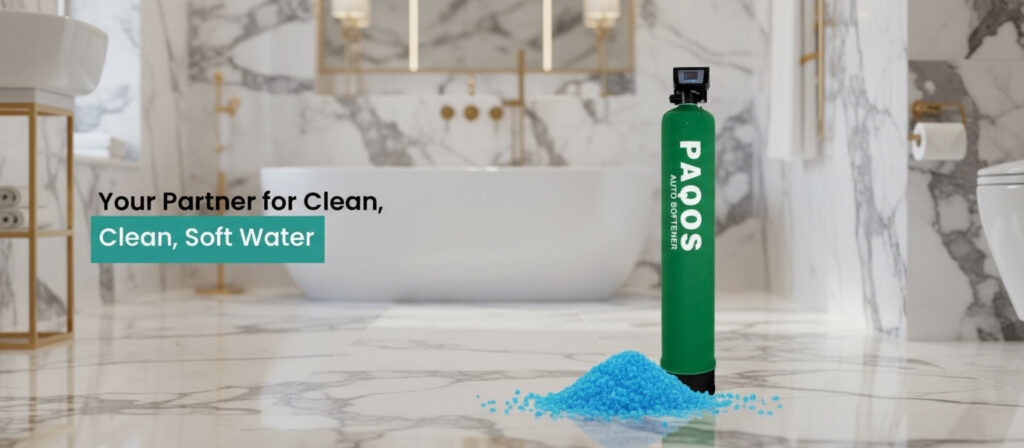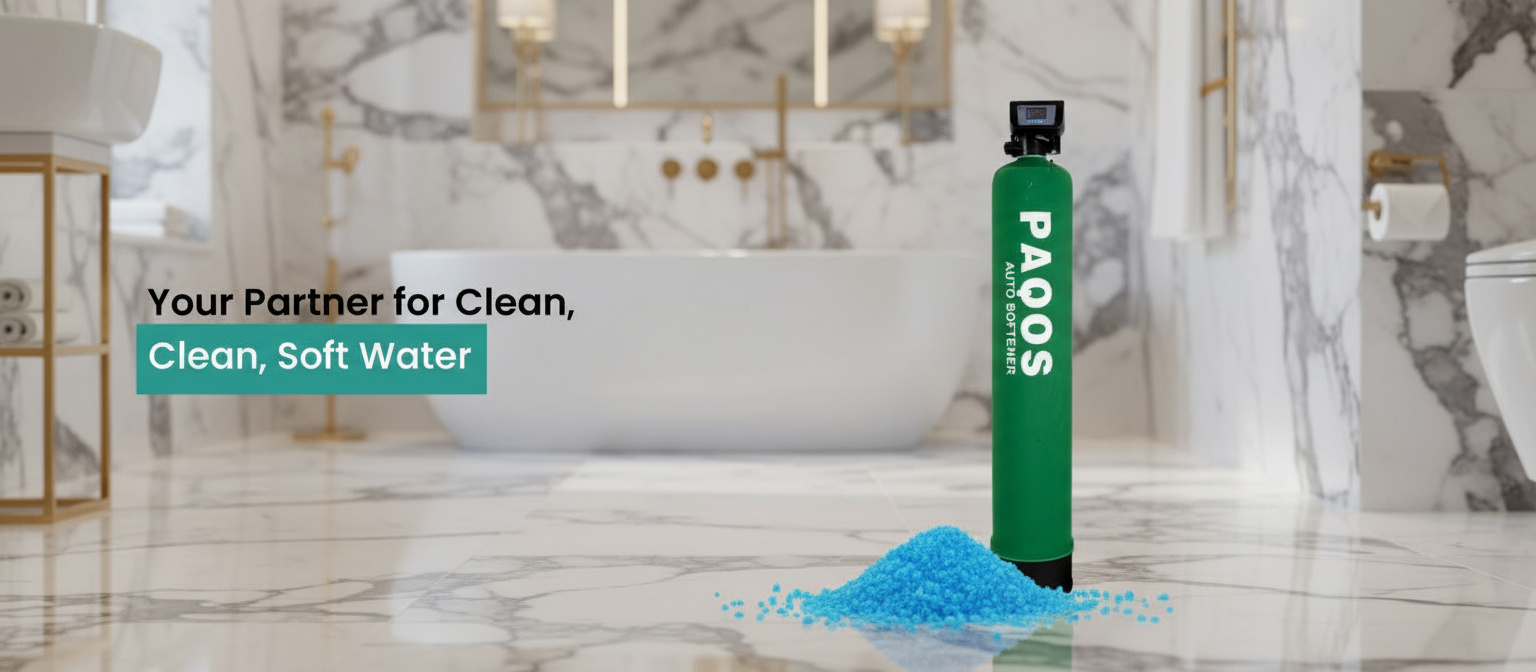Best Water Softener Salt for Indian Homes: Types, Prices & Benefits
IIf you’re searching for the best water softener salt India has to offer, you already know the magic it works on hard water. Choosing the right salt ensures your softener runs efficiently, protecting your appliances and making your daily life more comfortable. Gone are the days of limescale buildup, spotty dishes, and dry, itchy skin. But to keep that magic alive, your system needs a key ingredient: water softener salt. Choosing the right salt ensures your softener runs efficiently, protecting your appliances and making your daily life more comfortable.
This guide is designed for Indian homeowners like you. We will walk you through the different types of water softener salt, compare their prices, and explain the benefits of making the right choice. Whether you rely on borewell water, municipal supply, or tanker water, understanding your salt options is crucial for getting the best performance from your softener.
Why Indian Homes Need Quality Water Softener Salt
Across India, from bustling metro cities to quieter towns, hard water is a common problem. Hard water is rich in dissolved minerals, primarily calcium and magnesium. While not necessarily harmful to drink, it can cause a host of issues around the house.
A water softener system tackles this by using a process called ion exchange. Inside the softener is a tank filled with resin beads that are charged with sodium ions. As hard water flows through, the calcium and magnesium ions are attracted to the resin, and they “swap places” with the sodium ions. The result is softened water flowing to your taps.
Over time, the resin beads become saturated with hardness minerals and need to be “recharged.” This is where water softener salt comes in. The salt is used to create a brine solution that flushes the resin tank, washing away the collected calcium and magnesium and replenishing the beads with fresh sodium ions.
Using low-quality or the wrong type of salt can lead to:
- Salt Bridges: A hard crust of salt that forms in the brine tank, preventing the salt from dissolving and stopping the regeneration process.
- Mushy Tank Bottom: Undissolved salt and impurities can create a sludge-like layer, clogging the system.
- Reduced Efficiency: The softener won’t be able to effectively remove hardness minerals, and you’ll start seeing the old problems of limescale and soap scum return.
Types of Water Softener Salt: Rock, Solar, and Pellet
When you shop for water softener salt, you will generally find three main types. Each has its own purity level, form, and price point.
1. Rock Salt
As the name suggests, rock salt for water softener is mined from underground salt deposits. It looks like small, irregular pebbles or crystals.
- Purity: This is the least pure form of salt, typically containing a higher level of insoluble minerals and impurities.
- Pros: It is the most affordable option, making it a budget-friendly choice.
- Cons: The impurities can lead to a build-up of sediment and sludge in your brine tank over time. This means you will need to clean your tank more frequently to prevent clogs and maintain efficiency. It is also not ideal for households with very high water usage, as the frequent regeneration cycles can accelerate sediment buildup.
2. Solar Salt
Solar salt is produced through the evaporation of seawater or saltwater from lakes. It is often sold in crystal or pellet form.
- Purity: Solar salt is more soluble and purer than rock salt. The evaporation process leaves most impurities behind.
- Pros: It dissolves well and is less likely to cause salt bridges or tank mushing compared to rock salt. It offers a good balance between price and performance.
- Cons: While purer than rock salt, it can still contain some trace minerals that might require occasional tank cleaning.
3. Pellet Salt
Pellet salt is the most common and widely recommended type. It is made from evaporated salt that has been compressed into uniform pellets or cubes.
- Purity: This is the purest form of water softener salt, with very low levels of insoluble matter.
- Pros: The uniform shape and high purity prevent mushing and bridging in the tank. Pellet salt dissolves evenly and efficiently, ensuring a reliable regeneration cycle every time. This leads to less frequent tank cleaning and better overall performance of your softener.
- Cons: It is typically the most expensive option of the three.
Which Salt is the Best Water Softener Salt India Offers?
For most Indian households dealing with significant water hardness, pellet salt is the best water softener salt India has to offer. Its high purity ensures optimal performance, fewer maintenance issues, and consistently soft water.
While it has a higher upfront cost, its purity and efficiency offer better long-term value. The high purity means your best water softeners in India will run optimally with fewer maintenance headaches. You will spend less time cleaning out sludge and worrying about salt bridges, and your system will regenerate more effectively, providing consistently soft water.
If pellet salt is outside your budget, solar salt is a very respectable second choice. It offers much better performance than rock salt without the premium price tag of pellets. We generally recommend avoiding rock salt unless it is the only option available.
Water Softener Salt Benefits: More Than Just Soft Water
Using the correct, high-quality water softener salt does more than just keep your softener running. The benefits ripple throughout your home.
- Protects Appliances: Soft water prevents limescale buildup in your water heater, washing machine, dishwasher, and coffee maker, extending their lifespan and improving their efficiency.
- Reduces Soap and Detergent Use: Soft water allows soap to lather properly. You will find you need less soap, shampoo, and laundry detergent to get the job done, saving you money.
- Softer Skin and Hair: Hard water minerals can leave a residue on your skin and hair, making them feel dry and dull. Soft water rinses clean, leaving your skin and hair feeling softer and healthier.
- Cleaner Dishes and Fixtures: Say goodbye to chalky white spots on your glasses, dishes, and faucets. Soft water leaves everything sparkling clean.
- Brighter, Softer Clothes: Minerals in hard water can get trapped in the fabric of your clothes, making them stiff and causing colors to fade. Clothes washed in soft water look brighter and feel softer.
It is also important to consider your overall water quality. While a softener tackles hardness, understanding factors like the ideal TDS levels in drinking water and the best pH value of drinking water can help you create a complete water treatment solution for your home. You can read more about water treatment solutions on our blog.
Tips to Save Money on Water Softener Salt
While quality salt is an investment, there are ways to manage the cost effectively.
- Buy in Bulk: Purchasing larger bags or multiple bags at once almost always lowers the price per kilogram.
- Check Your Softener Settings: Make sure your water softener is programmed correctly for your home’s water hardness level and water usage. An over-regenerating system will waste both salt and water.
- Monitor Salt Levels: Don’t just fill the tank to the top and forget about it. Check the level once a month. Only add salt when the tank is about one-third full to prevent bridging.
- Invest in a High-Efficiency Softener: Modern, high-efficiency water softeners use significantly less salt and water per regeneration cycle, leading to substantial long-term savings.
- Use a Quality Water Tank: Pairing your softener with high-quality stainless steel water tanks ensures the water entering your system is free from rust and contaminants from the tank itself, which helps your softener operate more efficiently.
A quick note on health: water softeners add a small amount of sodium to your water. For most people, this amount is negligible. However, if you are on a strict low-sodium diet, it is worth exploring the health effects of low TDS water and consulting with a health professional.
Your Partner for Clean, Soft Water
Choosing the best water softener salt India has to offer is a simple but powerful step toward maintaining a healthy and efficient home. By understanding the differences between rock, solar, and pellet salt, you can make an informed decision that balances cost, performance, and convenience. For most homes in India, the superior purity of pellet salt makes it the wisest investment for trouble-free operation and consistently soft water.

Ready to explore the best water softener salt India has to offer? From softeners to purifiers, Paqos water solutions has the expertise and products to ensure your family gets the best water possible. Visit Paqos.in to learn more.


